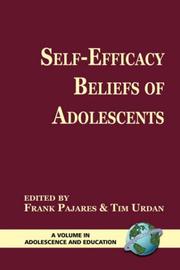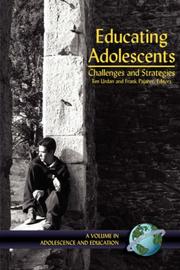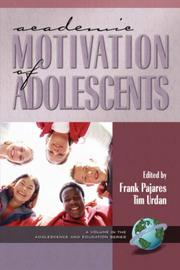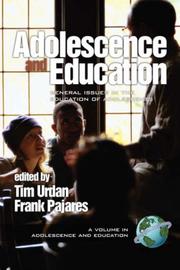| Listing 1 - 8 of 8 |
Sort by
|

ISBN: 1593113668 1593113676 9781593113674 9781593113667 9781607527503 1607527502 1281373524 9786611373528 Year: 2006 Publisher: Greenwich, Conn. IAP - Information Age Pub.
Abstract | Keywords | Export | Availability | Bookmark
 Loading...
Loading...Choose an application
- Reference Manager
- EndNote
- RefWorks (Direct export to RefWorks)
The introduction of the psychological construct of self-efficacy is widely acknowledged as one of the most important developments in the history of psychology. Today, it is simply not possible to explain phenomena such as human motivation, learning, self-regulation, and accomplishment without discussing the role played by self-efficacy beliefs. In this, the fifth volume of our series on adolescence and education, we focus on the self-efficacy beliefs of adolescents. We are proud and fortunate to be able to bring together the most prominent voices in the study of self-efficacy, including that of the Father of Social Cognitive Theory and of self-efficacy, Professor Albert Bandura. It is our hope, and our expectation, that this volume will become required reading for all students and scholars in the areas of adolescence and of motivation and, of course, for all who play a pivotal role in the education and care of youth.
Self-efficacy --- Adolescent psychology --- Efficacy expectations --- Expectancies of self-efficacy --- Expectations of self-efficacy --- Self-efficacy expectancies --- Self-efficacy expectations --- Psychology, Applied --- Adolescence --- Teenagers --- Psychology --- Self-efficacy. --- Adolescent psychology.

ISBN: 9781607524809 9781607524816 9781607524823 1607524805 9781617350146 1617350141 9781617350153 161735015X 1607524813 1617350168 9781617350160 1593111533 9781593111533 1593111541 9781593111540 1607524821 1281373427 9786611373429 1281373400 9786611373405 Year: 2004 Publisher: Greenwich IAP
Abstract | Keywords | Export | Availability | Bookmark
 Loading...
Loading...Choose an application
- Reference Manager
- EndNote
- RefWorks (Direct export to RefWorks)
School management and organization. --- Educational leadership. --- School environment. --- Lerarenopleiding --- Algemeen. --- High school teaching --- Identity (Psychology) in adolescence --- Teenagers --- #PBIB:2005.2 --- Adolescents --- Teen-agers --- Teens --- Young adults (Teenagers) --- Youth --- Adolescent psychology --- Education --- Environment, School --- Educational sociology --- College leadership --- Education leadership --- School leadership --- Leadership --- Administration, Educational --- Educational administration --- Inspection of schools --- Operation policies, School --- Policies, School operation --- School administration --- School inspection --- School operation policies --- School organization --- Schools --- Management --- Organization --- Inspection --- Management and organization --- Teachers --- Teaching --- Biographical methods in education --- Biography in education --- Biography --- Faculty (Education) --- Instructors --- School teachers --- Schoolteachers --- School employees --- In-service training --- Research --- Methodology. --- Biographical methods.

ISBN: 1607527537 9781607527534 1593110677 9781593110673 1593110669 9781593110666 Year: 2003 Publisher: Greenwich, Conn. Information Age Pub.
Abstract | Keywords | Export | Availability | Bookmark
 Loading...
Loading...Choose an application
- Reference Manager
- EndNote
- RefWorks (Direct export to RefWorks)
EDUCATION --- Secondary --- Adolescence --- Education, Secondary --- Teenagers --- #PBIB:2005.2 --- Adolescents --- Teen-agers --- Teens --- Young adults (Teenagers) --- Youth --- Children --- High school education --- High school students --- Secondary education --- Secondary schools --- Education --- High schools --- Teen-age --- Puberty --- Social aspects --- Education (Secondary) --- Development
Book
Abstract | Keywords | Export | Availability | Bookmark
 Loading...
Loading...Choose an application
- Reference Manager
- EndNote
- RefWorks (Direct export to RefWorks)
A volume in Adolescence and Education Series Editors Tim Urdan, Santa Clara University and Frank Pajares Emory University Paulo Freire wrote that "sometimes a simple, almost insignificant gesture on the part of a teacher can have a profound formative effect on the life of a student." Sometimes, of course, this formative effect is not the result of a simple, isolated gesture but rather of a proactive and sustained series of gestures on the part of a teacher. Many of us have been deeply influenced by one or more teachers who have exercised a formative effect in our development as students and individuals. We remember these teachers with fondness, tell their stories to our own children, think of them with affection, respect, gratitude, even reverence. Sometimes, we recognized this influence as it was happening, and we grew close to these remarkable individuals, keeping them in our lives even after we graduated from their classes. Often, however, they themselves were unaware of the influence they exercised over us, for it was not until years passed that we realized their effect. If time and distance did not prevent it, perhaps we found our way back to these educators and shared with them our appreciation and gratitude. In this volume, outstanding scholars in the fields of adolescence and education provide short stories describing their most memorable teacher. Some provide the story on its own; other follow it with a brief analysis drawn from theory and research in education, psychology, and human development to identify key concepts and principles that apply in explaining why the selected teacher was so effective and memorable. Some write about one specific teacher; others write about the qualities that they believe contribute to teaching excellence, including anecdotes from various teachers to support the qualities they identified. Each tells the story with an eye toward being accessible to a wide audience of readers. One need not be an academic, or an expert in education or psychology, to understand and find meaning in these stories. In essence, these are stories and analyses that capture just what it is that makes a particular teacher, as our title describes, unforgettable. This book would be excellent for teacher preparation courses, educational psychology courses, and for anyone who is interested in the art and science of teaching.

ISBN: 1281386820 9786611386825 1607525542 9781607525547 1931576629 9781931576628 1931576637 9781931576635 1931576629 9781931576628 Year: 2002 Publisher: Greenwich, Conn. Information Age Pub.
Abstract | Keywords | Export | Availability | Bookmark
 Loading...
Loading...Choose an application
- Reference Manager
- EndNote
- RefWorks (Direct export to RefWorks)
Motivation in education. --- High school teaching. --- Middle school teaching.

ISBN: 1931576629 Year: 2002 Publisher: Greenwich Information Age
Abstract | Keywords | Export | Availability | Bookmark
 Loading...
Loading...Choose an application
- Reference Manager
- EndNote
- RefWorks (Direct export to RefWorks)
High school teaching --- Middle school teaching --- Motivation in education

ISBN: 1931576440 Year: 2001 Publisher: Greenwich Information Age
Abstract | Keywords | Export | Availability | Bookmark
 Loading...
Loading...Choose an application
- Reference Manager
- EndNote
- RefWorks (Direct export to RefWorks)
Book
ISBN: 9781607529828 1607529823 9781593119447 1593119445 9781593119430 1593119437 Year: 2008 Publisher: Charlotte, NC Information Age Pub.
Abstract | Keywords | Export | Availability | Bookmark
 Loading...
Loading...Choose an application
- Reference Manager
- EndNote
- RefWorks (Direct export to RefWorks)
| Listing 1 - 8 of 8 |
Sort by
|

 Search
Search Feedback
Feedback About UniCat
About UniCat  Help
Help News
News